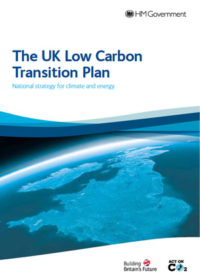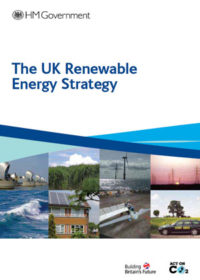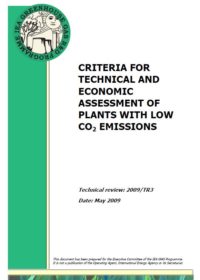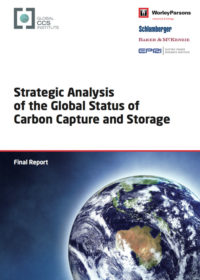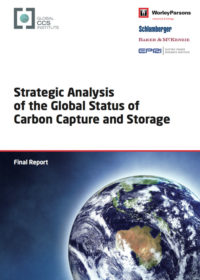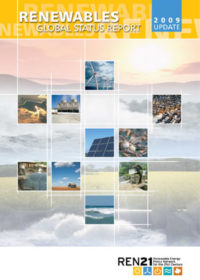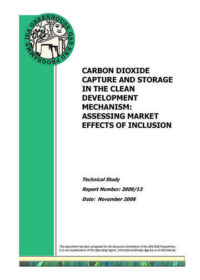Resources
Publications
Our publications, reports and research library hosts over 500 specialist reports and research papers on all topics associated with CCS.
View our Publication Library Disclaimer.
Filter by
The UK low carbon transition plan: national strategy for climate and energy
15th July 2009
Topic(s): Carbon capture use and storage (CCUS), Economics, Nuclear energy, Policy law and regulation, Renewables
This White Paper sets out the United Kingdom's low carbon transition plan from 2009 to 2020. This plan aims to deliver emission cuts of 18% on 2008 levels by 2020 (and over a one third reduction on 1990 levels).
Disclaimer
The content within the Global CCS Institute Publications, Reports and Research Library is provided for information purposes only. We make every effort and take reasonable care to keep the content of this section up-to-date and error-free. However, we make no claim as to its accuracy, currency or reliability.
Content and material featured within this section of our website includes reports and research published by third parties. The content and material may include opinions and recommendations of third parties that do not reflect those held by the Global CCS Institute.
The UK renewable energy strategy
1st July 2009
Topic(s): Domestic policy, Economics, Energy security, Policy law and regulation, Renewables
This strategy document explains how the UK Government will radically increase its use of renewable electricity, heat and transport to meet its legally-binding target to ensure 15% of its energy comes from renewable sources by 2020. The document describes how the United Kingdom will tackle climate change, reducing emissions of CO2 by over 750 million tonnes between 2009 and 2030. It will also promote the security of the UK’s energy supply, reducing overall fossil fuel demand by around 10% and gas imports by 20–30% against what they would have been in 2020. And it outlines opportunities for the UK economy with the potential to create up to half a million more jobs in the UK renewable energy sector resulting from around £100 billion of new investment. In parallel with energy saving, nuclear and carbon capture and storage, this is a key element of the nation’s overall transition plan for setting the UK on the path to achieve a low-carbon, sustainable future that helps address dangerous climate change.
Disclaimer
The content within the Global CCS Institute Publications, Reports and Research Library is provided for information purposes only. We make every effort and take reasonable care to keep the content of this section up-to-date and error-free. However, we make no claim as to its accuracy, currency or reliability.
Content and material featured within this section of our website includes reports and research published by third parties. The content and material may include opinions and recommendations of third parties that do not reflect those held by the Global CCS Institute.
Criteria for technical and economic assessment of plants with low CO2 emissions
1st May 2009
Topic(s): Carbon capture use and storage (CCUS), Policy law and regulation
The IEA Greenhouse Gas R&D Programme (IEA GHG) undertakes studies to assess technologies for abatement of greenhouse gas emissions. IEA GHG has concentrated on CO2 capture and storage (CCS) applied to power generation but it has also assessed CCS in other industries and will compare the relative merits of CCS and alternative greenhouse gas abatement options. Soon after IEA GHG started operation in 1991 it produced a set of standard technical and economic criteria for assessment of power plants with capture to ensure that its studies are undertaken on a consistent basis, as far as possible. These criteria have continued to be used since then, with some minor modifications.
In the time since IEA GHG was set up, economic conditions have changed, knowledge of CCS and other technologies has increased and IEA GHG has been undertaking increasingly detailed studies. In response to these changes IEA GHG has decided to revise and expand its assessment criteria. As a starting point IEA GHG’s criteria for new power plants with CO2 capture have been updated and some general guidelines for assessment of other types of plant with CO2 capture have been included. These changes are described in this report. Future work will look to expand the criteria to encompass retrofit of CO2 capture, the full CCS chain including CO2 transport and storage and non-CCS energy technologies. In the mean time a notional cost of CO2 transport and storage shall be assumed and sensitivities to a range of costs shall be assessed.
Disclaimer
The content within the Global CCS Institute Publications, Reports and Research Library is provided for information purposes only. We make every effort and take reasonable care to keep the content of this section up-to-date and error-free. However, we make no claim as to its accuracy, currency or reliability.
Content and material featured within this section of our website includes reports and research published by third parties. The content and material may include opinions and recommendations of third parties that do not reflect those held by the Global CCS Institute.
Strategic analysis of the global status of carbon capture and storage. Report 3: policies and legislation framing carbon capture and storage globally
31st March 2009
Topic(s): Carbon capture use and storage (CCUS), Policy law and regulation
In May 2009, a consortium led by WorleyParsons and comprising Schlumberger, Electric Power Research Institute and Baker & McKenzie was engaged to undertake the Strategic Analysis of the Global Status of Carbon Capture and Storage.
The consortium was tasked to undertake a comprehensive survey of the status of CCS and to develop a series of reports analysing CCS projects, the economics of CCS, policies supporting CCS development and existing research and development networks. A fifth report - the Synthesis Report - was also developed and this summarises the findings of the first four reports, and provides a comprehensive assessment of the gaps and barriers to the deployment of large-scale CCS projects, including strategies and recommendations to address these issues.
Disclaimer
The content within the Global CCS Institute Publications, Reports and Research Library is provided for information purposes only. We make every effort and take reasonable care to keep the content of this section up-to-date and error-free. However, we make no claim as to its accuracy, currency or reliability.
Content and material featured within this section of our website includes reports and research published by third parties. The content and material may include opinions and recommendations of third parties that do not reflect those held by the Global CCS Institute.
Strategic analysis of the global status of carbon capture and storage. Report 3: country studies, international policy and legislation
31st March 2009
Topic(s): Carbon capture use and storage (CCUS), Policy law and regulation
In May 2009, a consortium led by WorleyParsons and comprising Schlumberger, Electric Power Research Institute and Baker & McKenzie was engaged to undertake the Strategic Analysis of the Global Status of Carbon Capture and Storage.
The consortium was tasked to undertake a comprehensive survey of the status of CCS and to develop a series of reports analysing CCS projects, the economics of CCS, policies supporting CCS development and existing research and development networks. A fifth report - the Synthesis Report - was also developed and this summarises the findings of the first four reports, and provides a comprehensive assessment of the gaps and barriers to the deployment of large-scale CCS projects, including strategies and recommendations to address these issues.
Disclaimer
The content within the Global CCS Institute Publications, Reports and Research Library is provided for information purposes only. We make every effort and take reasonable care to keep the content of this section up-to-date and error-free. However, we make no claim as to its accuracy, currency or reliability.
Content and material featured within this section of our website includes reports and research published by third parties. The content and material may include opinions and recommendations of third parties that do not reflect those held by the Global CCS Institute.
Reconciling King Coal and Climate Change: A regulatory framework for carbon capture and storage
1st January 2009
Topic(s): Policy law and regulation
This paper provides an overview of CCS technology and then focuses on what the authors see as the major gaps in the US system for regulating CCS. These gaps are first, the unresolved property law issues and second, the issue of long term liability for stored CCS.
Disclaimer
The content within the Global CCS Institute Publications, Reports and Research Library is provided for information purposes only. We make every effort and take reasonable care to keep the content of this section up-to-date and error-free. However, we make no claim as to its accuracy, currency or reliability.
Content and material featured within this section of our website includes reports and research published by third parties. The content and material may include opinions and recommendations of third parties that do not reflect those held by the Global CCS Institute.
Scenarios on the introduction of CO2 emission performance standards for the EU power sector
1st January 2009
Topic(s): Energy efficiency, Policy law and regulation
In this paper, the introduction of Emission Performance Standards (EPS) as a means for po-tential emission reductions in the European power sector was assessed. EPS in the power sec-tor can already be found in California, USA, since 2007 as well as in the US states of Oregon, Washington and Montana, which introduced EPS schemes following the example of Califonia.
Disclaimer
The content within the Global CCS Institute Publications, Reports and Research Library is provided for information purposes only. We make every effort and take reasonable care to keep the content of this section up-to-date and error-free. However, we make no claim as to its accuracy, currency or reliability.
Content and material featured within this section of our website includes reports and research published by third parties. The content and material may include opinions and recommendations of third parties that do not reflect those held by the Global CCS Institute.
Advancing technology transfer for climate change mitigation: Considerations for technology orientated agreements promoting energy efficiency and carbon capture and storage (CCS)
1st January 2009
Topic(s): Carbon capture use and storage (CCUS), Policy law and regulation
The study examines the international governance of technology transfer, the performance of different instruments in delivering new technologies, and reviews proposals aiming at increased technology transfer. The study further examines a number of critical (pre)conditions for technology oriented treaties that can effectively promote technology transfer both within or outside the UNFCCC framework - in two technology spheres: carbon capture and storage (CCS) technologies, and technical applications for energy efficiency within the building sector.
Disclaimer
The content within the Global CCS Institute Publications, Reports and Research Library is provided for information purposes only. We make every effort and take reasonable care to keep the content of this section up-to-date and error-free. However, we make no claim as to its accuracy, currency or reliability.
Content and material featured within this section of our website includes reports and research published by third parties. The content and material may include opinions and recommendations of third parties that do not reflect those held by the Global CCS Institute.
Renewables global status report 2009 update
1st January 2009
Topic(s): Domestic policy, Economics, Global Status Report, Policy law and regulation, Renewables
This ‘Update’ edition of the Renewables Global Status Report is the fourth in a series launched in 2005. It provides an integrated picture of the global renewable energy situation, while coming in the midst of an historic and global economic crisis.
Disclaimer
The content within the Global CCS Institute Publications, Reports and Research Library is provided for information purposes only. We make every effort and take reasonable care to keep the content of this section up-to-date and error-free. However, we make no claim as to its accuracy, currency or reliability.
Content and material featured within this section of our website includes reports and research published by third parties. The content and material may include opinions and recommendations of third parties that do not reflect those held by the Global CCS Institute.
Carbon dioxide capture and storage in the clean development mechanism: assessing market effects of inclusion
13th November 2008
Topic(s): Carbon capture use and storage (CCUS), Carbon markets, Policy law and regulation
The report presents findings associated with the possible inclusion of carbon dioxide capture and geological storage (CCS) within the Kyoto Protocol’s clean development mechanism (CDM), and the potential repercussions this could have on the global regulated carbon market.
In order to achieve this, it examines the effects of creating additional certified emission reduction (CER) 'offsets' from CCS activities to the pool available for compliance by Annex B Parties to the Kyoto Protocol. The study also considers implications for 2020 in order to gauge potential market effects of CCS in any future, yet-to-be-agreed, post-2012 international carbon trading mechanism.
Disclaimer
The content within the Global CCS Institute Publications, Reports and Research Library is provided for information purposes only. We make every effort and take reasonable care to keep the content of this section up-to-date and error-free. However, we make no claim as to its accuracy, currency or reliability.
Content and material featured within this section of our website includes reports and research published by third parties. The content and material may include opinions and recommendations of third parties that do not reflect those held by the Global CCS Institute.
Climate change and carbon sequestration: Assessing a liability regime for long-term storage of carbon dioxide
7th August 2008
Topic(s): Carbon capture use and storage (CCUS), Policy law and regulation
As the world struggles with how to address climate change, one of the most significant questions is how to reduce increasing levels of carbon dioxide in the atmosphere. One promising technology is “carbon capture and sequestration” (CCS) which consists of capturing carbon dioxide (CO2) emissions from power plants and industrial sources and sequestering them in deep geologic formations for long periods of time. Areas for potential CO2 sequestration include oil and gas fields, saline aquifers, and coal seams. As Congress and the private sector begin to spend billions of dollars to research and deploy this technology, there has been insufficient attention paid to how to structure legal liability for the short-term or long-term risks associated with the geologic sequestration of CO2 in connection with CCS. Until now, federal and state legislators, when they have acted at all, have appeared to be in a rush to limit corporate liability for potential harm in order to encourage the development of CCS. We take a different approach. In this Article, we survey the existing environmental law and tort law liability regimes that may cover potential harm from escaping or migrating CO2. We conclude that while existing liability regimes are insufficient on their own to govern the CCS industry, existing federal and state environmental and tort liability can provide important risk management tools and serve as safeguards to private parties and state and local governments in the event of harm. Thus, state and federal legislation specific to CCS should leave in place this basic liability for full-scale commercial CCS projects. We also propose an adaptive governance model at the federal level for integrating several different compensation mechanisms including bonding, insurance, and pooled federal funding into commercial CCS project management to better provide financial security to investors without destroying existing liability protections for those who may suffer harm from CCS.
Disclaimer
The content within the Global CCS Institute Publications, Reports and Research Library is provided for information purposes only. We make every effort and take reasonable care to keep the content of this section up-to-date and error-free. However, we make no claim as to its accuracy, currency or reliability.
Content and material featured within this section of our website includes reports and research published by third parties. The content and material may include opinions and recommendations of third parties that do not reflect those held by the Global CCS Institute.
An assessment of carbon capture and storage under EC competition law
2nd May 2008
Topic(s): Policy law and regulation
This paper examines the impact of carbon capture and storage (CCS) on competition and EC competition law. Firstly, the state aid framework is analysed as CCS-projects will need subsidisation. Secondly,the impact of CCS on industry structure in the energy sector is analysed. It is concluded that CCS will probably lead to vertical integration and possible foreclosure. These problems can be overcome by an effective third party acces regime, but this is lacking in the legal framework for CCS. The rules on state aid are also considered to provide insufficient guidance.
Disclaimer
The content within the Global CCS Institute Publications, Reports and Research Library is provided for information purposes only. We make every effort and take reasonable care to keep the content of this section up-to-date and error-free. However, we make no claim as to its accuracy, currency or reliability.
Content and material featured within this section of our website includes reports and research published by third parties. The content and material may include opinions and recommendations of third parties that do not reflect those held by the Global CCS Institute.
